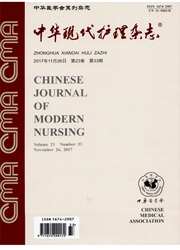

 中文摘要:
中文摘要:
目的探讨全程综合护理干预对关节置换术患者术后疼痛程度影响的效果研究。方法将116例接受关节置换术的患者随机分为干预组59例和对照组57例。两组实施手术前后均给予常规护理,干预组在此基础上针对患者不同的社会背景、文化程度、心理素质等实施术前预见性护理干预,术中全程陪护,术后疼痛护理干预及出院后随访干预为一体的全程综合性护理干预。比较两组患者干预效果。结果干预组术后疼痛强度低于对照组,术后8h干预组疼痛得分(6.54±1.65)分,对照组(9.63±1.73)分,两组比较差异有统计学意义(t=9.84,P〈0.01);干预组术后首次下床时间为(13.62±4.28)h,少于对照组的(19.83±5.27)h,住院时间为(14.17±2.43)d,少于对照组的(17.67±3.51)d,总治疗费用为(5883.70±43.40)元,少于对照组的(7581.38±55.24)元,差异均有统计学意义(t分别为6.95,6.22,183.64;P〈0.01);干预组术后生活质量评估得分为(5.92±0.33)分,对照组(3.78±0.25)分,两组比较差异有统计学意义(t=39.45,P〈0.叭)。结论对关节置换术患者实施全程综合性护理干预可有效地减轻患者术后疼痛,增强患者对疼痛的耐受力,提高了患者的舒适度及术后生活质量,改善睡眠质量,减少术后并发症,缩短了平均住院日,提高了患者的出院满意度及治疗效果,从而提高整体护理质量。
 英文摘要:
英文摘要:
Objective To discuss the effect of whole course comprehensive nursing intervention on postoperative pain of patients with joint replacement. Methods 116 cases who had joint replacement were randomly divided into the control group (n = 57) and the intervention group (n = 59). Both groups received conventional nursing before and after surgeries, and the intervention group received whole course comprehensive nursing intervention in addition, which included preoperative nursing intervention according to patient' s social background, standard of culture and psychological quality, whole course accompany during surgery, postoperative pain nursing intervention and follow-up after discharge. Intervention effect was compared between two groups. Results Pain degree was lower in the intervention group than in the control group. Pain score 8 hours after operation was (6.54±1.65) in the intervention group and (9.63±1.73) in the control group, and the difference was statistically significant ( t = 9.84, P 〈 0. 01 ). The first leaving bed time was ( 13.62±4.28 ) h in the intervention group and (19.83± 5.27) in the control group, hospitalization time was (14.17±2.43 ) d in the intervention group and ( 17.67±3.51 )d in the control group, treatment cost was ( 17.67±3.51) yuan in the intervention group and (7 581. 38±55. 24) yuan in the control group, and the differences were statistically significant (t = 6.95, 6.22, 183.64, respectively ; P 〈 0.01 ). Score of life quality was (5.92±0.33) in the intervention group and (3.78 ±0.25 ) in the control group, and the difference was statistically significant (t = 39.45, P 〈 0.01 ). Conclusions The implementation of whole course comprehensive nursing intervention for joint replacement patients can effectively relieve their postoperative pain, enhanced their pain tolerance, improve their comfort, quality of life and sleep quality, reduce postoperative complications, shorten average hospital stay, and raise their s
 同期刊论文项目
同期刊论文项目
 同项目期刊论文
同项目期刊论文
 期刊信息
期刊信息
